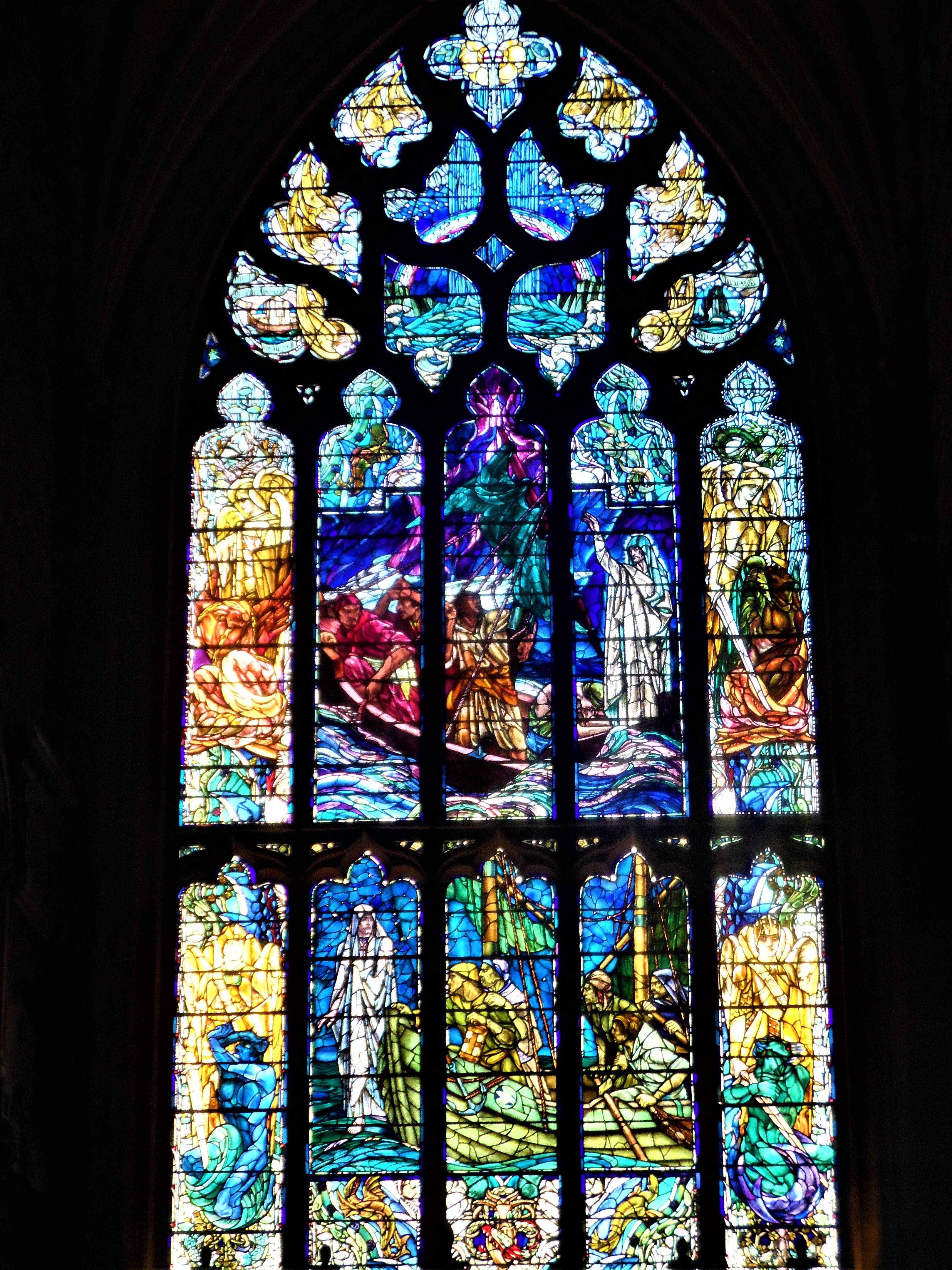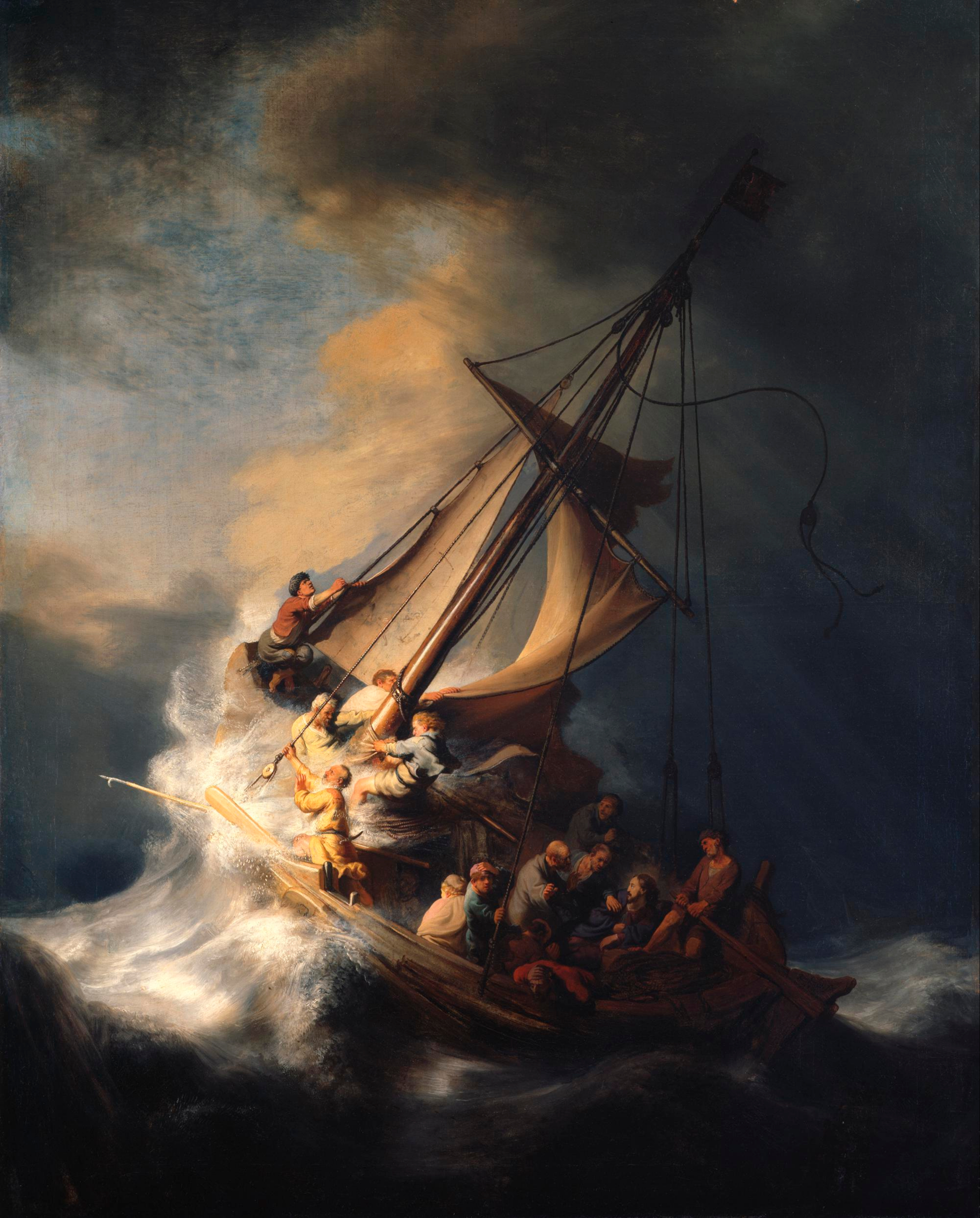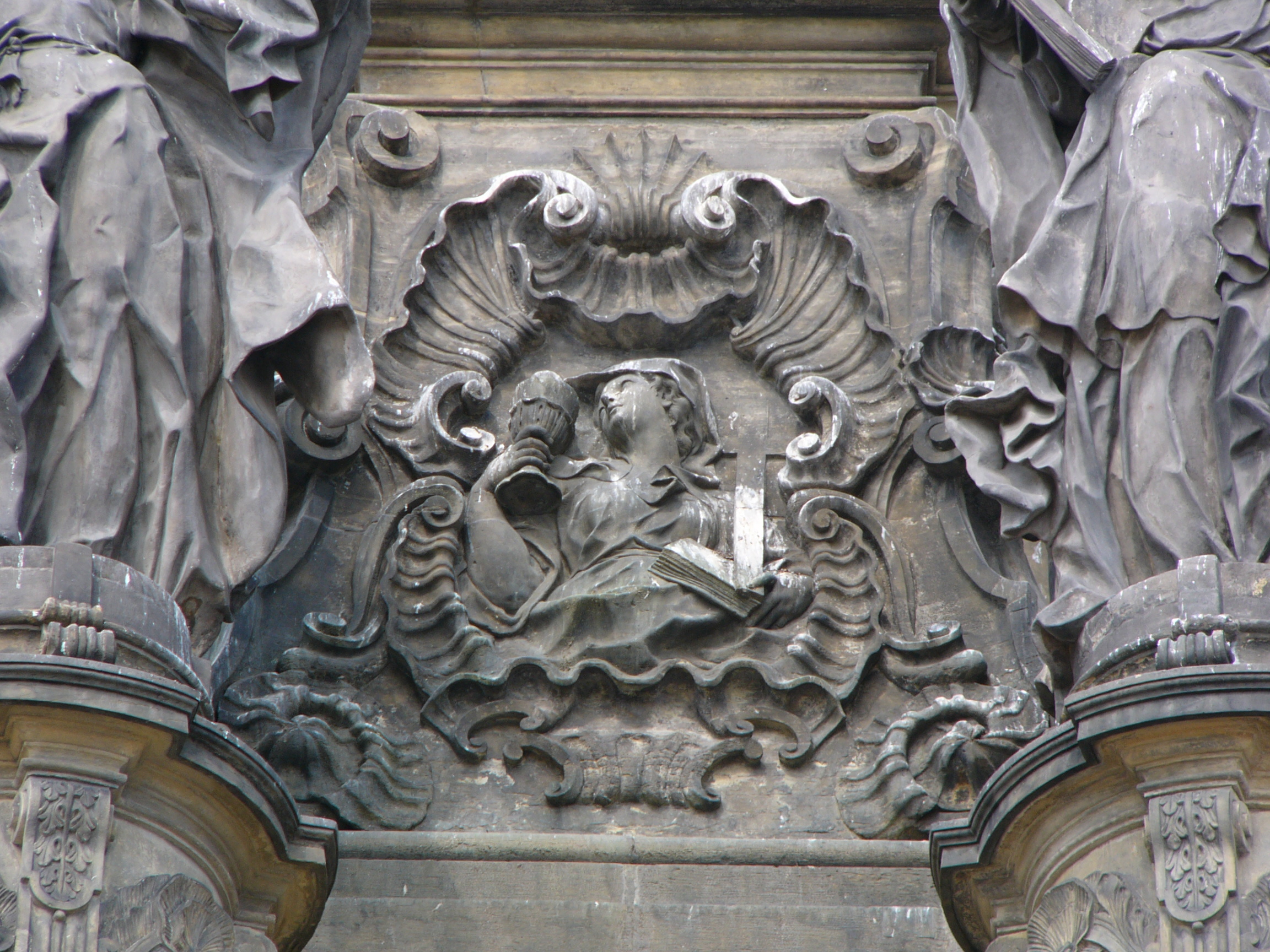|
Jesus Walks On Water
Jesus walking on the water, or on the sea, is recorded as one of the miracles of Jesus recounted in the New Testament. There are accounts of this event in three Gospels— Matthew, Mark, and John—but it is not included in the Gospel of Luke. This story, following the miracle of the feeding of the five thousand, tells how Jesus sent the disciples by ship back to the "other side" of the Sea of Galilee (the western side) while he remained behind, alone, to pray. Night fell and the sea arose as the ship became caught in a wind storm. After rowing against the wind for most of the night, the disciples saw Jesus walking on the water. They were frightened, thinking that they were seeing a spirit, but when Jesus told them not to be afraid, they were reassured. After Jesus entered the ship, the wind ceased, and they arrived at land. Biblical narratives The story of Jesus walking on water is retold in the gospels of Matthew, Mark, and John; it is not in the Gospel of Luke. This epi ... [...More Info...] [...Related Items...] OR: [Wikipedia] [Google] [Baidu] |
John The Baptist
John the Baptist ( – ) was a Jewish preacher active in the area of the Jordan River in the early first century AD. He is also known as Saint John the Forerunner in Eastern Orthodoxy and Oriental Orthodoxy, John the Immerser in some Baptist Christianity, Christian traditions, and as the prophet Yahya ibn Zakariya in Islam. He is sometimes referred to as John the Baptiser. John is mentioned by the History of the Jews in the Roman Empire, Roman Jewish historian Josephus, and he is revered as a major religious figure in Christianity, Islam, the Baháʼí Faith, the Druze faith, and Mandaeism; in the last of these he is considered to be the final and most vital prophet. He is considered to be a prophet of God in Abrahamic religions, God by all of the aforementioned faiths, and is honoured as a saint in many Christian denominations. According to the New Testament, John anticipated a messianic figure greater than himself; in the Gospels, he is portrayed as the precursor or forerunn ... [...More Info...] [...Related Items...] OR: [Wikipedia] [Google] [Baidu] |
Ulrich Luz
Ulrich Luz (23 February 1938 – 13 October 2019) was a Swiss theologian and professor emeritus at the University of Bern. Early life He was born on 23 February 1938 in Männedorf. He studied Protestant theology in Zurich, Göttingen and Basel under Hans Conzelmann, Eduard Schweizer and Gerhard Ebeling. Academic career He taught at the International Christian University in Tokyo from 1970 to 1971. From 1972 to 1980 he was professor for New Testament studies at Göttingen University. He was the New Testament professor at the University of Bern in Switzerland until his retirement in 2003. Much of his research focused on the Gospel of Matthew and was made available in English in the Hermeneia commentary on the Gospel, which was released in three volumes over a period of more than 20 years. Luz served as president of the Studiorum Novi Testamenti Societas in 1998. Personal life He and his wife, Salome Keller, had three children. Honours Luz had seven honorary doctorates. He r ... [...More Info...] [...Related Items...] OR: [Wikipedia] [Google] [Baidu] |
Calming The Storm
Calming the storm is one of the miracles of Jesus in the Gospels, reported in Matthewbr>8:23–27 Markbr>4:35–41 and Lukebr>8:22–25(the Synoptic Gospels). This episode is distinct from Jesus' walk on water, which also involves a boat on the lake and appears later in the narrative. Biblical accounts According to the Gospels, one evening Jesus and his disciples were crossing the Sea of Galilee in a boat. Suddenly a furious storm came up, with the waves breaking over the boat so that it was nearly swamped. Jesus was asleep on a cushion in the stern, and the disciples woke him and asked, "Teacher, don't you care if we drown?" The Gospel of Mark then states that: Analysis Author Michael Keene commented that the Sea of Galilee was known for its sudden and fierce storms and that the Jews were people of the land who were generally uncomfortable at sea, especially since they believed the sea to be full of frightening creatures. The '' Pulpit Commentary'' attributes these sudde ... [...More Info...] [...Related Items...] OR: [Wikipedia] [Google] [Baidu] |
Bible (American Standard)/Matthew
The Bible is a collection of religious texts that are central to Christianity and Judaism, and esteemed in other Abrahamic religions such as Islam. The Bible is an anthology (a compilation of texts of a variety of forms) originally written in Hebrew, Aramaic, and Koine Greek. The texts include instructions, stories, poetry, prophecies, and other genres. The collection of materials accepted as part of the Bible by a particular religious tradition or community is called a biblical canon. Believers generally consider it to be a product of divine inspiration, but the way they understand what that means and interpret the text varies. The religious texts were compiled by different religious communities into various official collections. The earliest contained the first five books of the Bible, called the Torah in Hebrew language, Hebrew and the Pentateuch (meaning 'five books') in Greek. The second-oldest part was a collection of narrative histories and prophecies (the Nevi'im ... [...More Info...] [...Related Items...] OR: [Wikipedia] [Google] [Baidu] |
Craig A
Craig may refer to: People and fictional characters *Craig (surname), including a list of people and fictional characters * Craig (given name), including a list of people and fictional characters * Clan Craig, a Scottish clan Places United States *Craig, Alaska, a city * Craig, Colorado, a city * Craig, Iowa, a city * Craig, Missouri, a city * Craig, Montana, an unincorporated place * Craig, Nebraska, a village * Craig, Ohio, an unincorporated community *Craig County, Oklahoma *Craig County, Virginia * Craig Township, Switzerland County, Indiana * Craig Township, Burt County, Nebraska * Mount Craig (Colorado) * Mount Craig (North Carolina) * Craig Mountain, Oregon *Craig Field (airport), a public airport near Selma, Alabama, formerly: **Craig Air Force Base, a former United States Air Force base * Craig Hospital, a neurorehabilitation and research hospital in Englewood, Colorado, United States * Fort Craig, a United States Army fort in New Mexico *The Craig School, an independent ... [...More Info...] [...Related Items...] OR: [Wikipedia] [Google] [Baidu] |
Faith In Christianity
Faith in Christianity is often discussed in terms of believing God in Christianity, God's promises, trusting in his faithfulness, and relying on God's character and faithfulness to act. Some denominations believe in the New Covenant and in the doctrine of Salvation in Christianity, salvation by justification by faith, faith alone (). According to most Christian traditions and denominations, Christian faith requires a belief in the resurrection of Jesus, and the Agony in the Garden which Jesus states is the plan of God the Father. Since the Protestant Reformation of the 16th century, the meaning of the term ''faith'' has been an object of major Christian theology, theological disagreement in Western Christianity. The differences have been largely overcome in the Joint Declaration on the Doctrine of Justification (1999). The precise understanding of the term "faith" differs among the Christian denomination, various Christian traditions. Despite these differences, Christians generally ... [...More Info...] [...Related Items...] OR: [Wikipedia] [Google] [Baidu] |
Dwight Pentecost
John Dwight Pentecost (April 24, 1915 – April 28, 2014) was an American Christian theologian, best known for his book ''Things to Come''. Pentecost was born in Pennsylvania and died in Dallas, Texas. His wife was Dorothy Harrison Pentecost (June 17, 1915 – June 21, 2000). John and Dorothy had two daughters: Jane Pentecost Fenby and Gwendolyn Ann Pentecost Arnold. Career Pentecost held a B.A. from Hampden–Sydney College (1937) and Th.M. (1941) and Th.D. (1956) degrees from Dallas Theological Seminary. During his academic career he taught biblical subjects for over 60 years ( Philadelphia College of Bible, 1948–55; Dallas Theological Seminary, 1955–2014). He was Distinguished Professor Emeritus of Bible Exposition at DTS, one of only two so honored. Pentecost was ordained in 1941 at Cambridge Springs, Pennsylvania, into the Presbyterian Church, serving as a pastor there from 1941 to 1946, and then at Saint John's Presbyterian Church in Devon, Pennsylvania, from 1946 to ... [...More Info...] [...Related Items...] OR: [Wikipedia] [Google] [Baidu] |
Merrill C
Merrill may refer to: Places in the United States *Merrill Field, Anchorage, Alaska *Merrill, Iowa * Merrill, Maine * Merrill, Michigan * Merrill, Mississippi, an unincorporated community near Lucedale in George County * Merrill, Oregon * Merrill, Wisconsin * Merrill (town), Wisconsin * Merrill Township, Michigan * Merrill Township, North Dakota *Merrill College at the University of California, Santa Cruz People *Merrill (given name) *Merrill (surname) Other uses *Merrill (company), a division of Bank of America *Skidmore, Owings and Merrill, architectural firm * USS ''Merrill'' (DD-976) *Nine men's morris, a strategy board game also called ''Merrills'' * Merrill (crater) * Merrill, a companion character in ''Dragon Age II'' See also * Merril Merril is a given name and surname. Notable people with the name include: * Judith Merril (1923–1997), American and Canadian science fiction writer * Merril Anthony (1909–1967), Guyanese cricketer * Merril Bainbridge (born 1968), Aus ... [...More Info...] [...Related Items...] OR: [Wikipedia] [Google] [Baidu] |
Pericope
In rhetoric, a pericope (; Greek , "a cutting-out") is a set of verses that forms one coherent unit or thought, suitable for public reading from a text, now usually of sacred scripture. Description The term can also be used as a way to identify certain themes in a chapter of sacred text. Its importance is mainly felt in, but not limited to, narrative portions of Sacred Scripture (as well as poetic sections). Manuscripts—often illuminated—called pericopes, are normally evangeliaries, that is, abbreviated Gospel Books only containing the sections of the Gospels required for the Masses of the liturgical year. Notable examples, both Ottonian, are the Pericopes of Henry II and the Salzburg Pericopes. Lectionaries are normally made up of pericopes containing the Epistle and Gospel readings for the liturgical year. A pericope consisting of passages from different parts of a single book, or from different books of the Bible, and linked together into a single reading is calle ... [...More Info...] [...Related Items...] OR: [Wikipedia] [Google] [Baidu] |
Amédée Varint - Christ Marchant Sur La Mer
Amédée is a French masculine forename. Notable people with the forename include: Persons * Amédée, stage name of Philippe de Chérisey (1923–1985), French writer, radio humorist, surrealist and actor *Amédée Artus (1815–1892), French conductor and composer * Amédée Baillot de Guerville (1869–1913), French war correspondent *Amédée de Béjarry (1840–1916), French politician *Amédée Bollée (1844–1917), French bellfounder and inventor *Amédée Borrel (1867–1936), French biologist *Amédée Courbet (1827–1885), French army admiral * Amédée Dechambre (1812–1886), French physician * Amédée Despans-Cubières (1786–1853), French army general *Amédée Domenech (1933–2003), French rugby union player and politician *Amédée Dumontpallier (1826–1899), French gynecologist * Amédée Dunois (1878–1945), French lawyer, journalist, politician *Amédée Faure (1801–1878), French painter *Amédée Fengarol (1905–1951), French politician *Amédée E. F ... [...More Info...] [...Related Items...] OR: [Wikipedia] [Google] [Baidu] |




